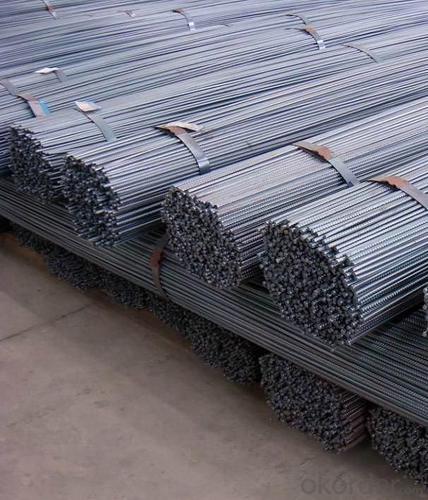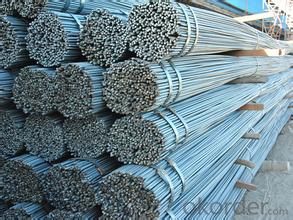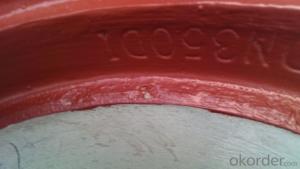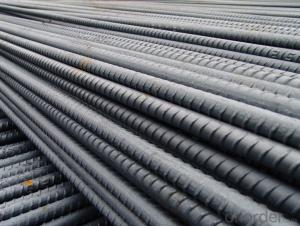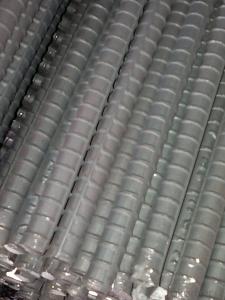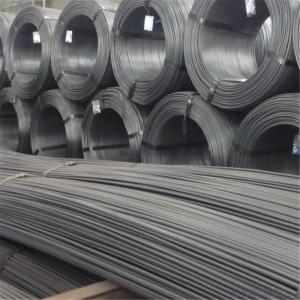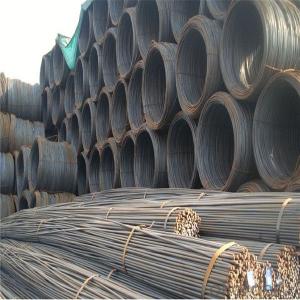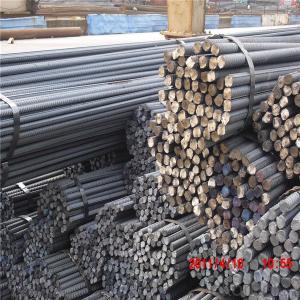Steel Reinforcing Rebar for Construction Usage
- Loading Port:
- Tianjin
- Payment Terms:
- TT or LC
- Min Order Qty:
- 1000 m.t.
- Supply Capability:
- 5000 m.t./month
OKorder Service Pledge
OKorder Financial Service
You Might Also Like
Steel Reinforcing Rebar for Construction Usage
Structure of Steel Reinforcing Rebar:
Type | Steel Reinforcing Rebar | MOQ | 500 MT (Trial order accepted) |
Standard Grade | GB1499.2-2007, HRB335, HRB400, HRB500. BS4449/2005, B500A, B500B etc.. ASTM A615 Gr.40, Gr60, KS, SD400, SD500 and so on.. | ||
Technique | Hot rolled continuous casting | Length | 6, 9,12m, or as requested |
Size | 6mm-32mm | Payment Terms | T/T, L/C at sight, Usance L/C |
Packing | In bundle | Inspection | Third party inspection accepted |
Trade terms | EXW, FOB, CFR, CIF | Transfer Term | FIO, FILO, FLT |
Delivery time | 15-30 days, according to the quantity | Note | Customized service is available (for sizes,length and chemical components etc.). |
Main Features of Steel Reinforcing Rebar :
HRB335 | Chemical composition | C | Mn | Si | S | P |
0.17-0.25 | 1.0-1.6 | 0.4-0.8 | 0.045 Max. | 0.045 Max. | ||
Mechanical Property | Yield strength | Tensile strength | Elongation | |||
≥335 Mpa | ≥455 Mpa | 17% | ||||
HRB500 | Chemical composition | C | Mn | Si | S | P |
0.25 Max. | 1.6 Max. | 0.8 Max. | 0.045 Max. | 0.045 Max. | ||
Mechanical Property | Yield strength | Tensile strength | Elongation | |||
≥500 Mpa | ≥630 Mpa | 15% | ||||
Specifications and Datas of Steel Reinforcing Rebar :
Deformed steel bar | ||||
Diameter (mm) | Theoretical weight (kg/m) | Pieces/Mt (pcs) | Length (m) | Standard |
6 | 0.222 | 375 | 12 | GB1499-48, HRB335, HRB400, HRB500 BS4449-97, Gr.460B,B500
|
8 | 0.395 | 211 | ||
10 | 0.617 | 135 | ||
12 | 0.888 | 94 | ||
14 | 1.21 | 69 | ||
16 | 1.58 | 53 | ||
18 | 2 | 42 | ||
20 | 2.47 | 34 | ||
22 | 2.98 | 28 | ||
25 | 3.85 | 22 | ||
28 | 4.83 | 17 | ||
32 | 6.31 | 13 | ||
36 | 7.99 | 10 | ||
40 | 9.87 | 8 | ||
50 | 15.42 | 5 | ||
FAQ:
Why choose us:
1. More than 10 years experience in this industry
2. 100,000 tons exporting per month
3. Professional foreign trade team
4. OEM&ODM capacity
5. High quality assured & competitive price
6. Try our best to meet your needs & save your budget
7. Very popular in Southeast Asia, Africa, Mid-East and South America etc.
8. VIP membership system, first time customers and long-term cooperation customers can get extra discount on some products.
Pictures:
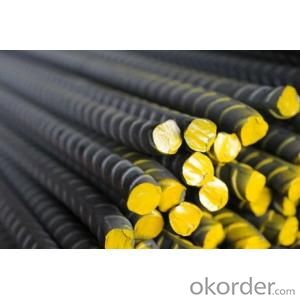
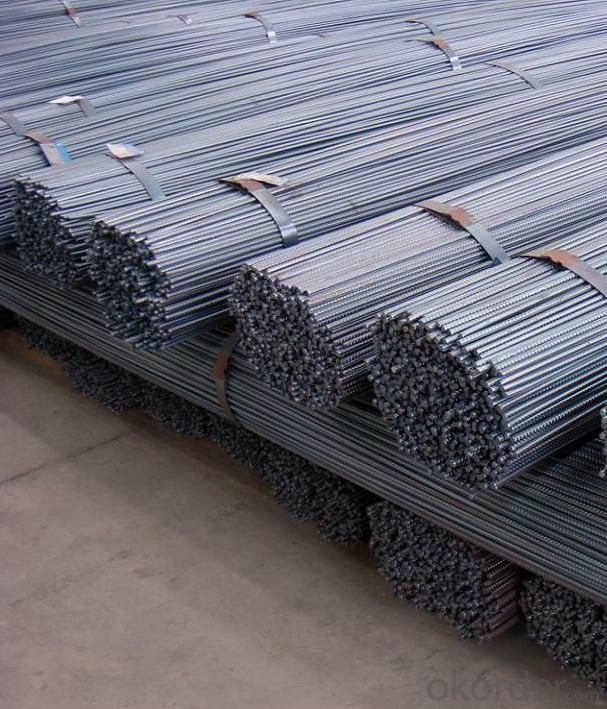
- Q: Can ductile iron pipes be used in high-pressure applications?
- High-pressure applications can indeed utilize ductile iron pipes. These pipes boast impressive strength and durability, which renders them suitable for managing high-pressure fluids or gases. When compared to alternative pipe types like PVC or HDPE, ductile iron pipes possess a higher pressure rating. Moreover, they exhibit excellent resistance to external loads and have the capacity to endure high internal pressures. Water and wastewater systems frequently employ these pipes, alongside industrial settings that encounter high-pressure conditions. Nevertheless, it is crucial to guarantee that ductile iron pipes utilized in high-pressure scenarios adhere to the necessary standards and specifications to assure safe and dependable operation.
- Q: Ductile iron pipe joint damage, water leakage, want to see the connection with other pipe fittings, how to operate?!
- The ductile iron pipe can be used as the plugging device for the big part
- Q: How much water seepage is allowed in the water pressure test for water hose DN300?
- The main control parameters of ductile iron pipes are nominal diameter, working pressure, connection mode, etc.. Light, high, thin wall, pressure resistance, shock resistance, corrosion resistance, earthquake resistance and other properties. The flexible interface is used for the pipeline interface, and there is a certain elongation and deflection angle. He has the advantages of raw iron pipes and steel pipes, avoiding the defects of iron and steel.
- Q: Are ductile iron pipes suitable for use in acidic environments?
- Highly acidic environments are generally unsuitable for the use of ductile iron pipes. While ductile iron is recognized for its strength and durability, it does have limitations in acidic conditions. Over time, acidic environments tend to corrode and deteriorate ductile iron pipes. Corrosion occurs when the acid in the environment reacts with the iron in the pipe, eventually leading to pipe failure. The rate at which corrosion occurs depends on several factors, including the concentration and type of acid, temperature, and duration of exposure. Acidic environments with pH levels below 4 or 5 can significantly accelerate the corrosion process. To address this limitation, alternative materials such as stainless steel or corrosion-resistant alloys like PVC or HDPE pipes are often recommended for use in acidic environments. These materials exhibit superior resistance to corrosion and can withstand the harsh conditions associated with acidic environments. However, it is worth noting that ductile iron pipes may still be suitable for use in mildly acidic conditions or if protective measures are implemented to prevent corrosion. The application of protective coatings or linings to the pipes can help minimize the corrosive effects of acids. Consulting experts or engineers who are knowledgeable about the specific conditions and requirements of the project is crucial in determining the most appropriate material for use in acidic environments.
- Q: Can ductile iron pipes be used for stormwater drainage?
- Yes, ductile iron pipes can be used for stormwater drainage. Ductile iron pipes are known for their strength, durability, and ability to withstand heavy loads, making them a suitable choice for various applications, including stormwater drainage systems.
- Q: Are ductile iron pipes suitable for use in hydroelectric dams?
- Hydroelectric dams benefit from the suitability of ductile iron pipes. Ductile iron, a more flexible and stronger type of iron compared to traditional cast iron, is an ideal option for various applications, including water transmission systems in hydroelectric dams. Ductile iron pipes possess durability and resistance to corrosion, which is essential in the continuous water exposure environment of a dam. They can endure high pressures and extreme temperatures, making them fitting for the demanding conditions within hydroelectric dams. Moreover, ductile iron pipes exhibit excellent joint integrity, guaranteeing their leak-proof and reliable performance throughout their lifespan. This aspect is crucial for maintaining the efficiency and effectiveness of a hydroelectric dam's water transmission system. Additionally, ductile iron pipes prove to be cost-effective when compared to materials like steel or concrete. With a long service life, minimal maintenance requirements, and easy availability, they present a practical choice for hydroelectric dam projects. In conclusion, ductile iron pipes are a viable option for hydroelectric dams due to their durability, corrosion resistance, high-pressure tolerance, joint integrity, and cost-effectiveness. They provide the necessary strength and flexibility to efficiently transport water within the dam, contributing to the overall success and longevity of the hydroelectric power generation system.
- Q: Will nodular cast iron pipes rust?
- Although the wall has a long flow of water, but oxygen scarce, compared with the outer wall is not easy to corrosion, but there is cement lining is necessary.
- Q: Why does the construction wastewater system use ductile iron pipes instead of galvanized steel tubes?
- Then answer your question: first, the strength of ductile iron is much higher than that of ordinary low carbon steel, such as Q235. Corrosion resistance is much higher than that of ordinary steel pipe and the cost is lower than that of ordinary steel pipe. Second, large diameter steel pipe can only be made of spiral welded pipe, seamless steel pipe is particularly expensive, will not be used. The welded pipe is welded, easy to corrosion water leakage. Third, galvanizing is also a life and very expensive, the pipe has a fluid will wear on the inner wall, zinc plating is meaningless. Galvanized pipe is generally used as a water supply pipe, large caliber water pipes, such as more than 250, and now do not use steel pipes, mostly plastic pipes
- Q: Can centrifugal cast iron pipe be galvanized or coated with asphalt which is good for corrosion prevention?
- 1, outdoor grounding of anti-corrosion, we must consider the contact resistance, so it is recommended not to use asphalt, and do not use anti-corrosion paint, preferably galvanized anti-corrosion.2, asphalt anti-corrosion paint has good water resistance, moisture resistance, corrosion resistance. Acid and alkali resistance, salt fog resistance, atmospheric exposure and so on. The utility model is suitable for coating internal and external surfaces of various containers and machinery, underground steel structures and underground pipelines for moisture proof, water resistance and corrosion prevention. The utility model is also suitable for repairing water cracks in houses.3, anticorrosive paint is used in the surface of the object, can be used to protect the interior of the object without corrosion of a kind of paint. It is one of the more commonly used than paint anti-corrosion paint in industrial construction, widely used in aviation, shipbuilding, chemical, oil pipelines, steel structures, bridges, oil rigs and other fields, by the vast number of manufacturers favor building.
- Q: How does ductile iron pipe handle ground movement and settlement?
- Ductile iron pipe is known for its excellent ability to handle ground movement and settlement. Due to its inherent strength and flexibility, it can withstand significant ground shifts without experiencing major damage or failure. One of the key features of ductile iron pipe is its high tensile strength, which allows it to withstand external forces and pressures. This strength enables the pipe to resist the effects of ground movement, such as soil settlement, subsidence, or shifting due to seismic activity. Moreover, ductile iron pipe has inherent flexibility, which allows it to absorb and distribute stress caused by ground movement. The pipe's flexibility helps to minimize the impact of settlement by allowing it to adjust and adapt to changes in the surrounding soil. This characteristic helps prevent the pipe from cracking, breaking, or leaking when the ground shifts or settles. Additionally, ductile iron pipes are often installed with flexible joints, such as push-on or mechanical joints, which further enhance their ability to accommodate ground movement. These joints provide a degree of flexibility and movement, allowing the pipe to adjust to changes in the soil without experiencing stress concentrations or structural failure. Furthermore, ductile iron pipe is highly resistant to corrosion, which is another important factor in its ability to handle ground movement and settlement. Corrosion can weaken pipes and make them more susceptible to damage during ground shifts. However, the corrosion-resistant properties of ductile iron help maintain the pipe's structural integrity and durability, even in challenging soil conditions. In summary, ductile iron pipe is well-suited to handle ground movement and settlement due to its high tensile strength, flexibility, and corrosion resistance. These properties allow the pipe to withstand external forces and adapt to changes in the surrounding soil, minimizing the risk of damage, leaks, or failure.
Send your message to us
Steel Reinforcing Rebar for Construction Usage
- Loading Port:
- Tianjin
- Payment Terms:
- TT or LC
- Min Order Qty:
- 1000 m.t.
- Supply Capability:
- 5000 m.t./month
OKorder Service Pledge
OKorder Financial Service
Similar products
Hot products
Hot Searches
Related keywords


